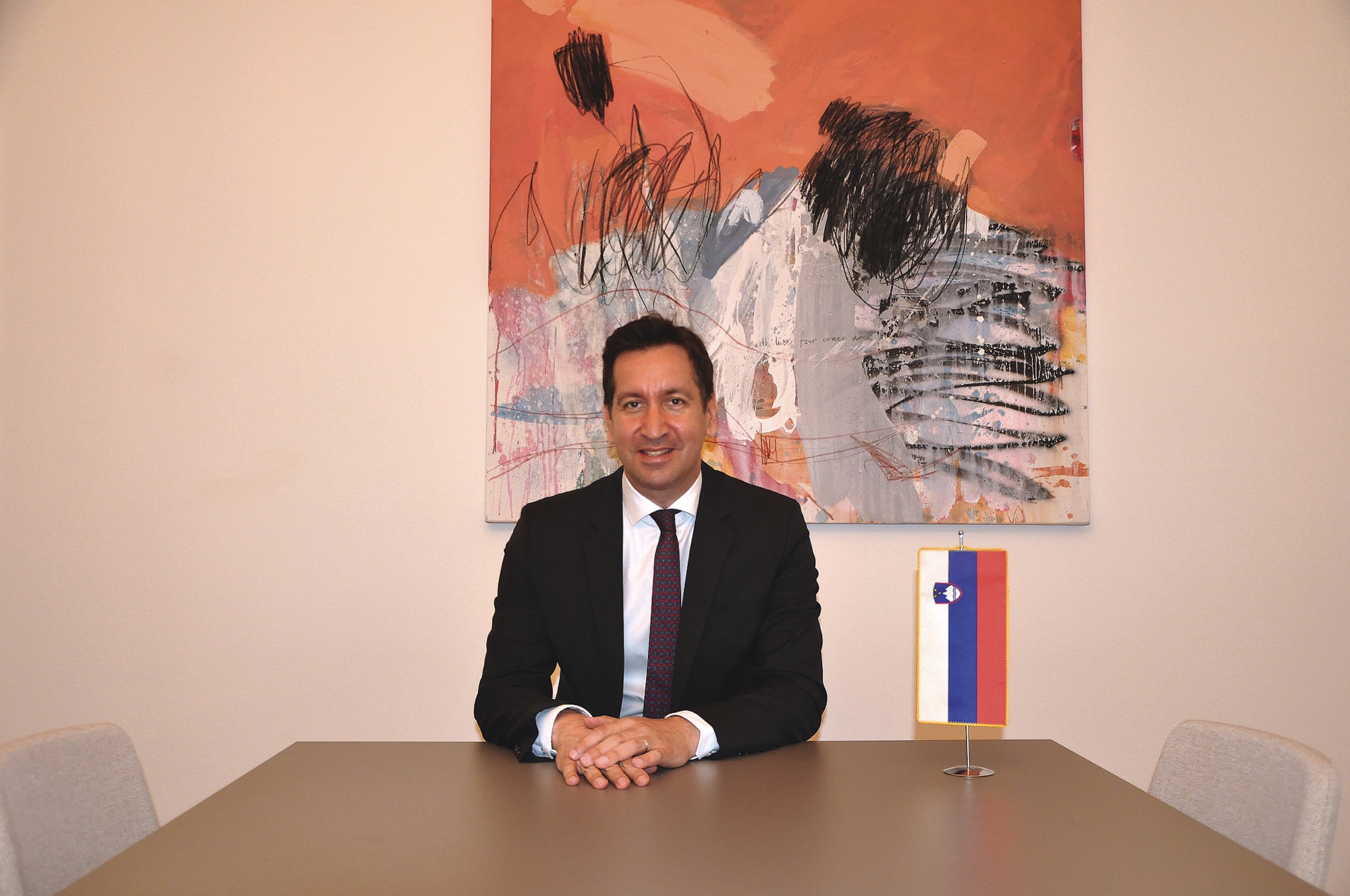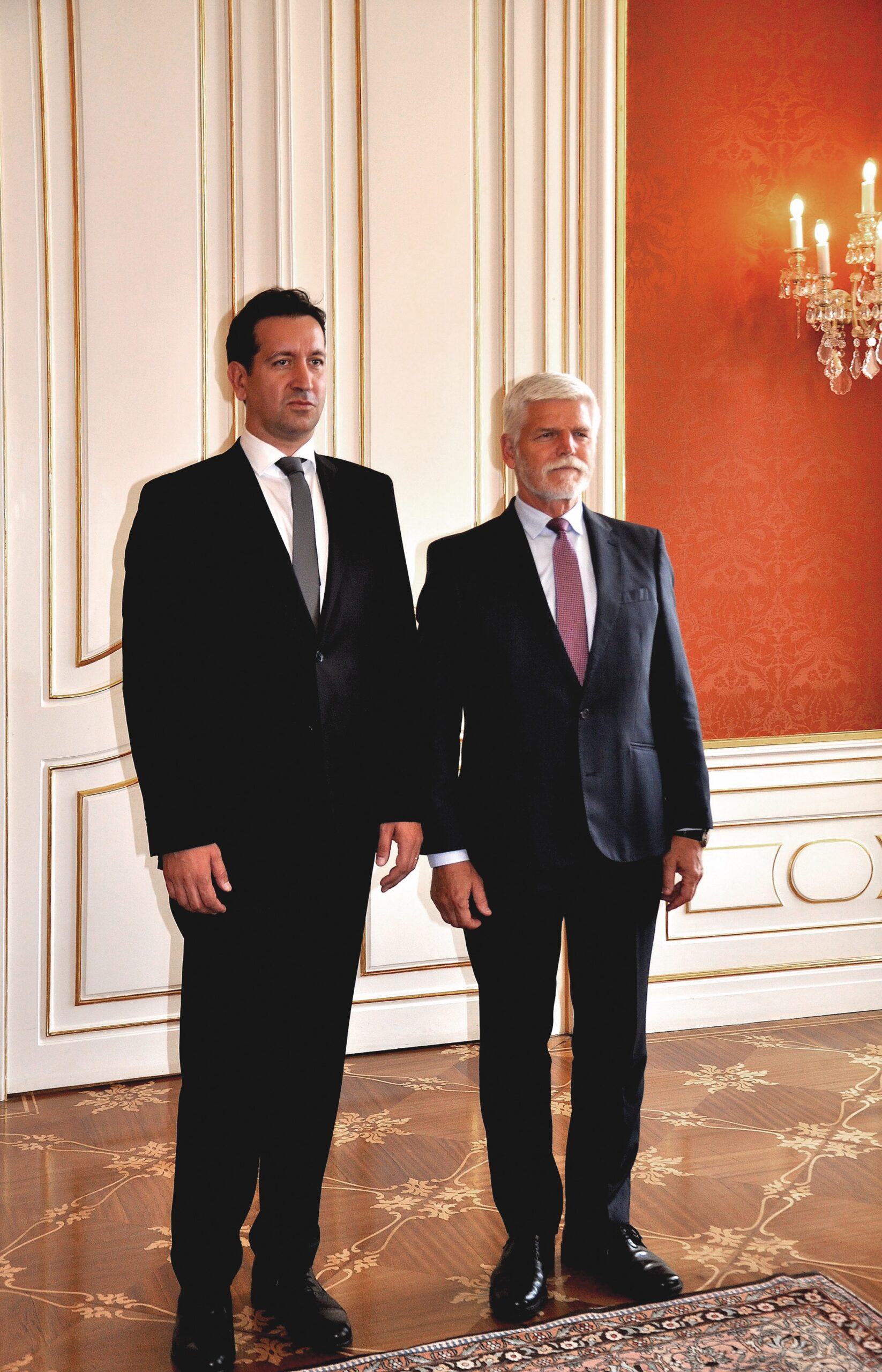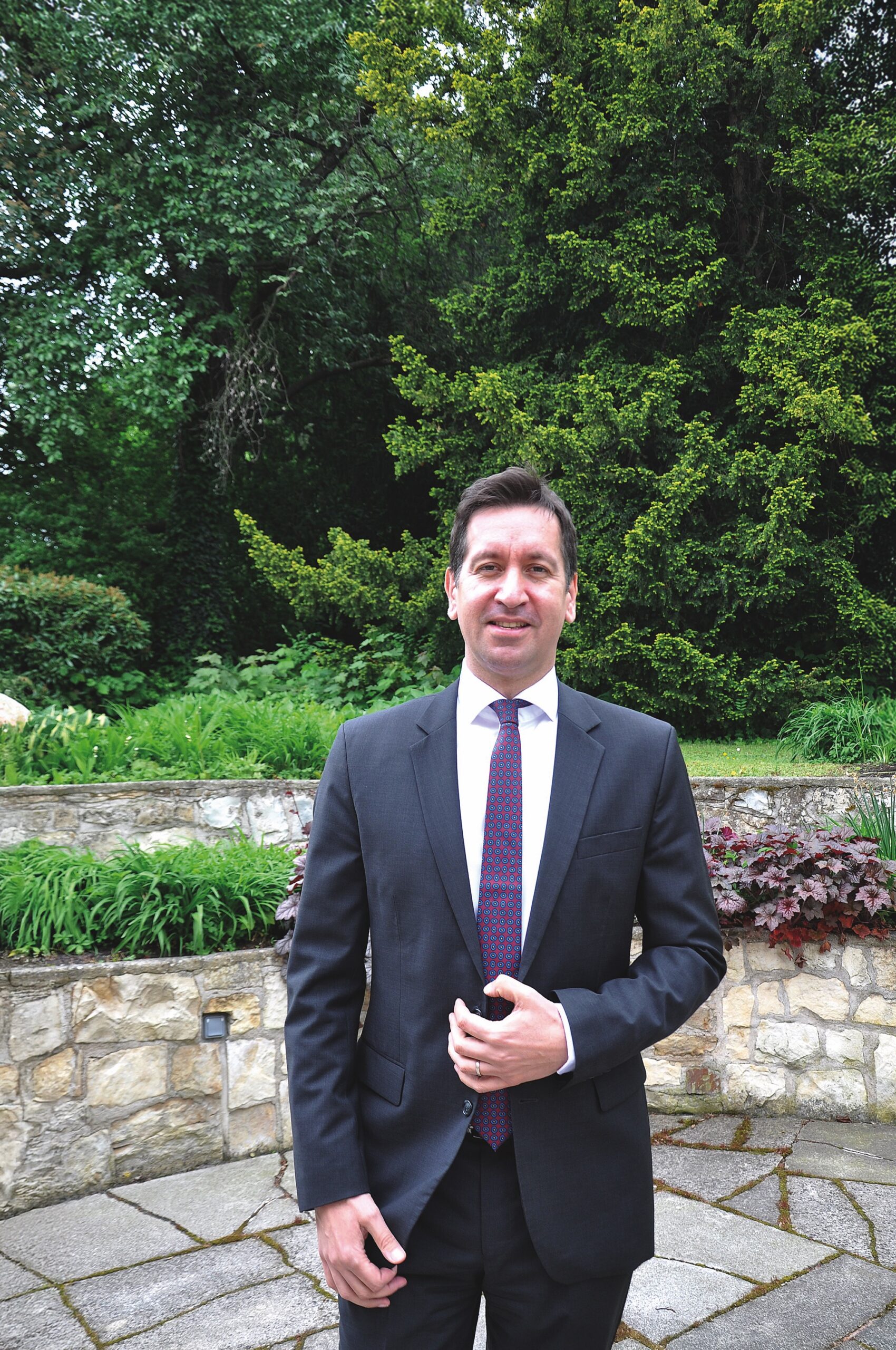Working together towards the same goal

H.E. Mr. Aleš Balut, Ambassador of Slovenia
Text: Martina Hošková and M. Zisso; Photo: Archive
What made you become an ambassador?
I have been interested in domestic and international politics for as long as I can remember, even as a child. This is probably in part because I grew up at a time and in a country where politics played such a significant role. We witnessed the dissolution of Yugoslavia and emergence of an independent Slovenia, the democratisation of our society, its economic transition, and the rise of our European Union aspirations. These developments affected us all, in different ways and to a different extent. In me, as an elementary school pupil and later high school student, they ignited an interest in political science, which I later studied.
After graduating, I dreamed of becoming a journalist or a researcher, to work in academia. I never really imagined becoming a diplomat. Joining the Ministry of Foreign Affairs was the consequence of a spontaneous decision. In 2000, I saw a newspaper advertisement for a job at the Foreign Ministry of Slovenia and I decided to apply. The rest is history. Today, I live and serve in Prague, in my 25th year in the job, but as my first time as ambassador.
Serving in the Czech Republic, which was historically an important place for Slovenes, is an honour. And, of course, it is a great responsibility for further improving, together with my colleagues at the embassy, the political and economic relations between Slovenia and the Czech Republic, promoting our cultural ties, and strengthening people-to-people contacts.
You have been Slovenia’s ambassador in Prague for almost a year now. Can you share some of your impressions?
I had been in the Czech Republic a few times before assuming this position. We have visited Prague and Brno privately on several occasions over the last 25 years. It is worth mentioning that I spent a very short period at Charles University as an undergraduate exchange student, and was part of a delegation of the then Slovenian foreign minister who visited the Czech Republic in 2007.
To be honest, I have not seen much of the country in my current capacity, but I am committed to travelling more in the Czech Republic. I have spent most of my time in Prague, visited Brno twice, and have briefly been to some smaller places like Jihlava and Mladá Boleslav.
Prague has always been a fascinating city, and one of Europe’s architectural marvels. A city that Slovenes have in the past considered as a cultural centre and a place of inspiration. The Mayor of Ljubljana, Ivan Hribar, who spoke Czech and lived and worked in Prague, was one of them. Not to mention famous Slovenian architect Jože Plečnik, a teacher at the Prague School of Applied Arts and a Prague Castle architect.
Nevertheless, I am impressed by the improvements over the years, making Prague a modern, functional, shining city. The numbers speak for themselves: more than 200% of the EU average in terms of GDP per capita is an amazing accomplishment for Prague and the Czech Republic. Brno, on the other hand, impresses me with its relaxed vibe and welcoming people, but also with its focus on future technologies and trade fairs. With its architecture, vibe, and size, Brno reminds me of the Slovenian capital, Ljubljana. I look forward to visiting other regions, cities, and towns around the Czech Republic, and – of course – to meeting the Czech people.

H.E. Mr. Aleš Balut, Ambassador of Slovenia and President Petr Pavel
What countries did you serve in before coming to Czechia?
I served in Rome in 2003 and in Sarajevo for over 12 years, which is more than three four-year mandates. During that period, I worked at various positions in the international community: as the head of cabinet, the head of department, the head of unit, etc. In between these diplomatic postings, I worked at our headquarters in Ljubljana. Among others, I served as the adviser to the Prime Minister and the head of cabinet to two ministers of foreign affairs. I am grateful that I could have these positions during important foreign policy projects for my country: the OSCE Chairmanship in Office in 2005, the first EU Presidency in 2008, the second EU Presidency in 2021, and during lobbying and non-permanent membership of Slovenia in the UN Security Council. Prague is therefore my third posting, and I am certain that it will be one to remember.
Does being a diplomat fit your preferred lifestyle?
To a very large extent, I enjoy what diplomacy, as a ‘lifestyle’, brings. I like meeting new people and exploring new cultures, although in the case of the Czech Republic, it is very difficult to say that this is an entirely different culture. The Czech and Slovenian languages are both Slavic, and our respective countries share a common history, from the Holy Roman Empire to the Austro-Hungarian Empire, that we were both a part of. Today, we are both part of the EU and NATO, which means that we share the same values as states.
There are regular contacts between our two countries at the political level and at the level of the administration. For example, less than two weeks after I assumed my current position, we had a visit of the Slovenian president to Prague, and this year we expect to continue fostering high-level cooperation. Most importantly, there are lively people-to-people contacts: Slovenia is not only a transit country for hundreds of thousands of Czechs, but the number of Czech tourists has been rising, with around 700,000 overnight stays last year. The Czechs are very welcome guests in Slovenia, and it is very nice to hear their positive comments about Slovenia. On a personal level, our family feels at home in the Czech Republic.
What do you find is the most challenging part of being an ambassador?
I would rather answer this question just before retirement, not after having only been in this position for less than a year (laughs). To me, being an ambassador is a team effort, not an individual performance – with the headquarters, the entire embassy team, and our Czech partners working together towards the same goal. The professional skills and personal attributes of an individual diplomat are important, but a single person cannot move a mountain.
The challenge also comes from the fact that I represent a country that is small, both geographically and population-wise, and, consequently, has limited resources. While we cannot do much to change these facts, we, Slovenian diplomats, do our best to contribute to the prosperity and overall success of our country by promoting Slovenia, including its economy and culture.
In particular, it is very important how countries the size of Slovenia are perceived. Credibility is key. Slovenia, just like the Czech Republic, has something to offer to the world. We have both demonstrated political stability, decent economic development, a very high level of human development, and a high level of safety. Slovenia has low levels of gender and income inequalities, and is a country with balanced regional development. Both countries also share the ambition to improve their economic performance, while remaining a reliable and trustworthy interlocutor to their partners.

H.E. Mr. Aleš Balut, Ambassador of Slovenia
This is your 25th year in diplomacy. Looking back, can you share a particular experience or adventure that stands out?
Like every diplomat, I have travelled quite extensively – mostly in Europe, but also to other continents. One could say that these were work adventures. Through work, I have had the opportunity to visit interesting places and participate in interesting meetings and conferences. I remember, for example, visiting the White House, attending the Annapolis Middle East Peace Conference, and participating in a G7 meeting in Kyoto. Or, for example, having the chance to meet Queen Elizabeth and Pope Benedict. Above all, I am grateful and very humbled to have had the opportunity to work with victims of the war in Bosnia and Herzegovina. That taught me huge life lessons, especially how to prioritise things in life differently. At the work level, this experience taught me about the purpose of diplomacy – to prevent and resolve conflicts, so that they do not escalate into devastation and human suffering.
Today’s Slovenia is among the destinations the Czech people consider when going on holiday. How do you promote your country in this respect?
There are essentially two ways in which we promote Slovenia – on the one hand by attending fairs and exhibitions, and on the other hand by organising individual promotional events.
The promotion of Slovenia as a tourist destination is indeed an important part of our work at the Embassy in Prague. In this context, the embassy collaborates closely with the Slovenian Tourist Organisation (STO). Our colleagues at the STO offer the Embassy impressive professional support and advice, and I am very thankful for that.
We also cooperate closely with our Slovenian language lecturers in Prague and Brno, who give us an extra helping hand in the promotion of our country through their projects, and there are also other individuals in the Czech Republic who assist us in our work with their ideas and events.
More than 15 years ago, we branded our country with a green-coloured slogan “I feel Slovenia”, which signals our commitment to nature and presents our country as an outdoor destination. We emphasise that Slovenia is a destination where four geographies meet: the Karst, the Alps, the Mediterranean, and the Pannonian plains. This offers a variety of possibilities for outdoor activities in a relatively small area: one can swim in the Adriatic Sea or Alpine lakes, hike, bike, camp, visit thermal spas or underground caves, ski in the winter, go canyoning, kayaking, or ziplining, and much more. Or, one can simply relax and savour the beautiful landscape while drinking a glass of nice Slovenian wine and enjoying a lovely dish. In fact, this is an aspect we have recently wanted to promote even more – Slovenia as a gastronomic destination.
Some of your readers from the diplomatic corps have probably heard of our so-called bee diplomacy, by which we promote bees and other pollinators as a means to safeguard nature. The bee diplomacy supports our “green Slovenia” brand.
I hope that our Team Slovenia in Czechia can inspire more Czechs and others to visit the country. We can assure you that Slovenia is more than worth your time, as many Czech people would confirm.
There are many things Czech tourists can do when holidaying in Slovenia. What do you do in your free time while working in Czechia?
When I am not in the office or attending work-related social events, I mostly spend time with my family at home or exploring the city. We also meet with our friends living in Prague. Recently, I have been trying to do as much sports as possible to stay in shape. Of course, I always try to find the time for a good book. In the future, our family plans are to explore the beautiful Czech Republic in order to see the wonderful places this country has to offer. We wish to understand this country and to connect with it as much as possible.
What is the current status of relations between the Czech Republic and Slovenia?
I would say that relations between Slovenia and the Czech Republic are excellent, without any open issues. The question is how to further improve these relations, and how our embassy can assist in these endeavours.
The embassy is focused on connecting Slovenia and the Czech Republic at the political and administration levels in order to improve the overall dialogue between the two countries. We continuously seek out possibilities to connect; or companies, industrial clusters, and institutions through which we would like to promote cooperation in this area, including through the transfer of knowledge. The embassy also works on cultural promotion and exchange; we see culture as a bridge builder of long-term understanding between countries and people. Naturally, the embassy also undertakes dialogue with its Czech counterpart, aiming to provide Ljubljana with some positive examples and practices that could be applied in Slovenia. I should stress that it is important to have intensive dialogue to compare notes. Here, the Czech Republic is important to us in many respects: its very active engagement on Ukraine, defence issues, internal security, the automotive industry, energy issues, IT, AI and semiconductors, and practically all areas. The aim of such dialogue is also to promote better understanding, as a prerequisite for much-needed EU and NATO unity. All these topics are discussed in these forums.
Lastly, I believe that there is room for improvement in our overall economic cooperation, both in trade and investment. In reality, this ultimately depends on the companies themselves, but we can, of course, provide assistance and information, which we do as much as possible.
As we celebrate Slovenia’s national day, can you share your wishes for your country? And for the Czech Republic?
I wish us all peace and prosperity. Only a few years ago, peace in Europe was taken for granted; now, we must work for it. Since this interview is taking place on Slovenia’s national day, I would like to quote our national anthem, the lyrics of which were written by Slovenia’s most famous poet, France Prešeren:
God’s blessing on all nations,
Who long and work for that bright day,
When o’er earth’s habitations
No war, no strife shall hold its sway;
Who long to see
That all men free
No more shall foes, but neighbours be.

